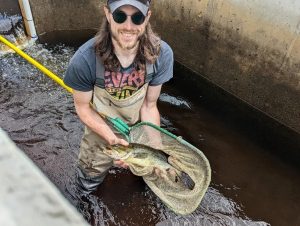Dillingham, Cody
 Advisor: Joseph Zydlewski – Maine Cooperative Fish and Wildlife Research Unit
Advisor: Joseph Zydlewski – Maine Cooperative Fish and Wildlife Research Unit
Start Date: Fall 2021
B.S. 2020, Biology, University of Maine
cody.dillingham@maine.edu, 207.581.2954
Brief Biography: I was raised in Cornville, Maine, a town that is exactly as rural as its name suggests. Growing up there meant growing up close to nature and this afforded me ample opportunities to engage with wildlife and a variety of natural systems, ranging from rivers and streams to forests and swamps. I would read books about dinosaurs and watch shows like Zoboomafoo, The Crocodile Hunter, and Bill Nye, the Science Guy. In Boy Scouts, I earned the World Conservation Award which is given to youth who “think globally and act locally to preserve and improve our environment.” These childhood experiences form the foundation upon which I have built my present-day enthusiasm and compassion for the environment.
In the present day, I study migratory fishes at UMaine. The majority of my research is around Sea lampreys, a 500-million-year-old species whose existence pre-dates the earliest dinosaurs (younger me would be so excited!). I also strive to stay active in my community, and I have done this through programs such as Americorps, 4H, and various outreach events through the University of Maine. I am also currently serving as the Vice President of UMaine’s American Fisheries Society Student Subunit where I am helping other students engage in fisheries science and volunteerism.
Current Research: I am studying Sea lamprey movement and habitat use in the Penobscot river. These native fishes are poorly understood by the local community as well as agencies across the state of Maine, and I am working to bridge that gap.
Additionally, I am studying the migration of Alewives in Togus Stream (a tributary of the Kennebec River) and how successful these fishes are at passing the fishway that drains the Togus Ponds. This fishway is brand-new and provides an opportunity to explore how well our fishway engineering is meeting the needs of our migratory fishes.
